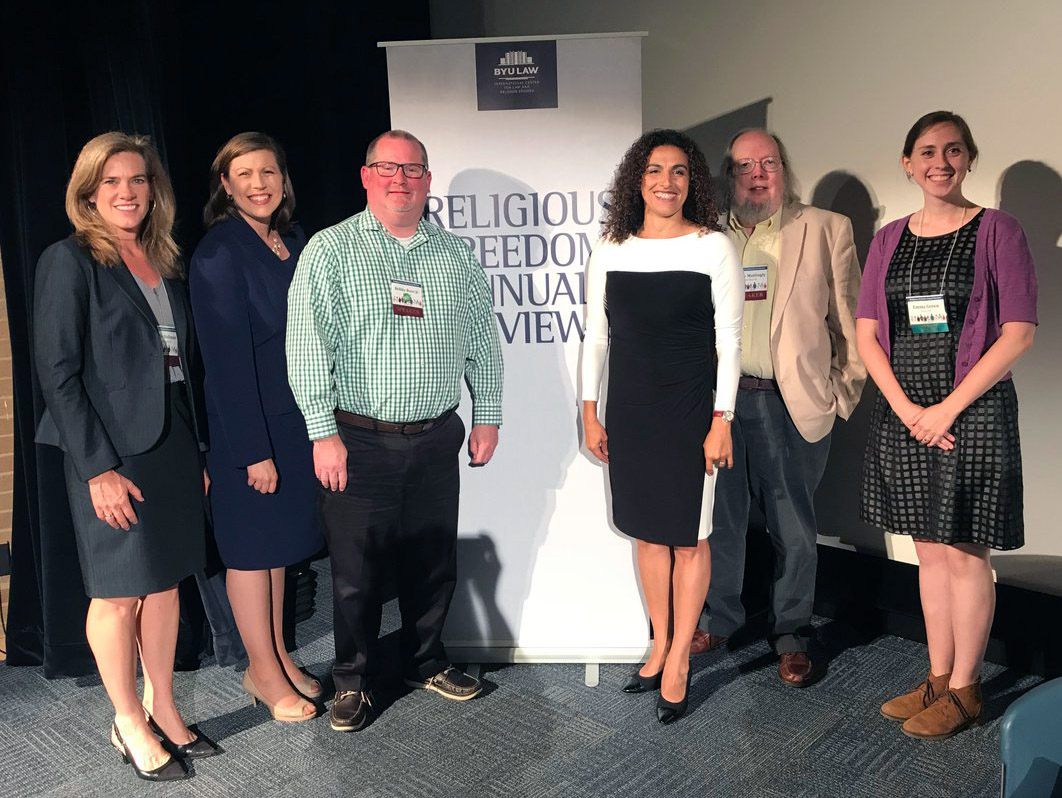Thursday General Session: Getting it Right: Media Coverage of Religious Freedom – Sahar Aziz, Emma Green, Holly Hollman, Terry Mattingly, Bobby Ross Jr.

by Chase Olsen, 2018 ICLRS Student Fellow
This general session was moderated by Hannah Clayson Smith, senior fellow at ICLRS. Panelists included Sahar Aziz, Emma Green, Holly Hollman, Terry Mattingly, and Bobby Ross Jr. The panel discussion surrounded the questions of why media coverage of religion and religious freedom has lost traction in news and journalism, as well as what journalists and religions can do to improve their dialogue and coverage of religious freedom issues.
So why doesn’t the religion beat get the same or similar coverage as other beats? The panelists agreed that the biggest factor in the decline in coverage on religion is economic downturn and the need for news outlets to focus on what makes money. However, another issue that is seen is that news outlets often feel they can cover religion appropriately by using their reporters who specialize in other areas such as politics and international affairs. But this approach can often lead to inaccuracies and incomplete coverage for religious people and groups. For example, Bobby Ross Jr, chief correspondent for The Christian Chronicle, said that the Dallas Morning News put a story on their front page about the Southern Baptist Convention meeting at Fort Worth. But since they had no professional religion reporters, the coverage was quite shallow and political. “Their focus was on women’s roles at the convention, and they didn’t talk to any women at all,” said Ross.
Similarly, the Muslim faith has been negatively affected by incomplete coverage of their religion. Because fewer professional religious reporters are employed, Muslims and the Islamic faith are consistently covered by reporters focused on politics, migration, war, and terrorism. So, according to Sahar Aziz, professor of law at Rutgers, Muslims get associated with these politicized themes and negative images, without a full understanding of how their faith does good and influences their experiences and participation in world events. “We need competent, professional people who are familiar with these diverse communities.” Muslims are also an over-generalized people, with reporters using simplistic explanations of religion to explain nuanced and difficult concepts of religion and how it informs the minds and actions of Muslim individuals and communities.
According to Emma Green, staff writer for The Atlantic, when a journalist is hired for and specializes in religion, they “walk through the appropriate door” to get to the story. If a journalist walks through the door of politics to get to a religious story, they won’t consider the full effect of theology and faith commitment on the motivations of religious individuals. “The religious story is too often deferred to political voices,” said Holly Hollman, general counsel and associate executive director of the Baptist Joint Committee. “If it affects churches, you would think reporters would talk to church members. But they often don’t.”
So what can religious organizations do to improve coverage of their own religion. “Try to develop a personal connection with the reporter and be willing to take the time to let them in,” advised Ross. Terry Mattingly, syndicated columnist and senior fellow for Media and Religion at King’s College New York, also advised that all religious organizations have a press committee. Having people who know how to work with the media and are assigned to help them get the right story would help improve media coverage of religion dramatically.
And what about reporters? How can they improve coverage of religion? The panel agreed that one of the most important things was to try to get rid of the liberal vs. conservative religion dichotomy. Trying to fit religions into a politically binary narrative is detrimental to the reader’s understanding of the nuances of any religious belief system or religious participators in world events.
Mattingly also advises his journalism students to always ask, “What people or organizations on the other side of the issue do you respect?” Using this question, according to Mattingly, will get a reporter better sources and content than any other method. And if the organization cannot answer that question then that tells the reporter something about that organization as well.